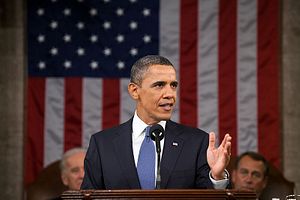Over at Vox, Zach Beauchamp directs us to the (I presume) newly released annual Gallup U.S. global leadership poll for 2013.
For the poll, Gallup asked 130,000 people across 130 countries whether they approved or disapproved of the job performance of the U.S. leadership (read: Obama). This question, to my mind, is confusing and likely resulted in the respondents interpreting it—and thus responding—in different ways.
Nonetheless, the report brings some good news for Washington: foreign approval ratings of the U.S. leadership’s job performance increased in 2013. Whereas in 2012 the median approval rating of U.S. leadership was 41 percent, in 2013 it shot up to 46 percent.
The bad news is that in 2012 the U.S. leadership had received its lowest approval ratings since President Barack Obama took office. As a result, the 46 percent approval rating from 2013 was still below the 49 percent approval rating the U.S. leadership received when Obama first took office in 2009.
Some of the gain in Obama’s approval rating last year came from a 5 percent increase in Europe. This is somewhat surprising given the Edward Snowden revelations, although Gallup points out that the increase probably reflects the economic recovery in the Eurozone.
More importantly, especially to Diplomat readers, America’s approval rating increased most markedly in Asia, where it went from 37 percent in 2012 to 45 percent in 2013. While this is lower than the global median, this is attributable to the fact that Gallup includes the Middle East in its Asia category, and countries like Iran, Palestine, Lebanon and Yemen bring the region’s overall approval of Obama down considerably.
If only the Indo-Pacific were included, Obama’s approval would be much higher. Indeed, within the region, the five countries that gave Obama the highest approval ratings were all Asia-Pacific nations, with his highest approval rates coming from Cambodia (67 percent), followed by New Zealand (62 percent), the Philippines (62 percent), Australia (59 percent) and South Korea (54 percent).
Moreover, Gallup notes that Asia’s approval rating of America’s leadership in 2013 was the highest the organization ever recorded during either the Obama or George W. Bush administrations. Some of this was driven by double-digit increases in Pakistan and Afghanistan, which in the latter had a plurality of respondents say they approved of Obama’s job performance. Obama’s approval ratings also improved by double digits in Bangladesh and Myanmar.
Admittedly, I initially assumed that China’s more assertive behavior was largely behind the higher approval ratings Obama received from Asian nations in 2013. In fact, the opposite appears to be true; the countries in Asia that are most concerned about China had a lower approval rating of Obama’s leadership than they did in 2012.
For example, in Japan the American leadership’s approval rating dropped by 6 percent, from 52 percent approval in 2012 to just 46 percent last year. Similarly, in Vietnam, only 21 percent of respondents approved of Obama’s job performance in 2013, down six percent from the year before. While approval ratings in the Philippines were an impressive 62 percent in 2013, this was also down from 64 percent during 2012. And in India, which also had its fair share of bitter disputes with China in 2013, the U.S. leadership saw its approval ratings drop to just 22 percent, down slightly from 25 percent in 2012.
The one exception to this rule is that approval of Obama’s job performance in Taiwan was an enviable 47 percent last year. This was up 9 points from 38 percent in 2012, and many times higher than Taiwan’s own president’s approval rating
In short, the Gallup poll was a mixed bag for the U.S. in Asia. On the one hand, approval of U.S. leadership is at an all-time high for this century. At the same time, there appears to be far less approval of Obama’s China policy, at least among the neighbors that are most concerned about Beijing’s assertive policies.

































